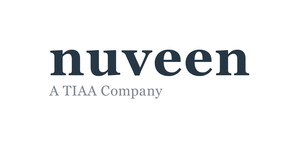
NEW YORK, Dec. 16, 2021 /PRNewswire/ -- Nuveen, the global investment manager of TIAA, has successfully completed the initial public offering of the Nuveen Variable Rate Preferred & Income Fund (NYSE: NPFD). The closed-end fund will begin trading on the New York Stock Exchange (NYSE) today, under the symbol NPFD.
The fund raised $550 million in its common share offering, excluding any exercise of the underwriters' option to purchase additional shares. If the underwriters exercise that option in full, the fund will have raised approximately $633 million.
The fund seeks to provide a high level of tax-advantaged current income and total return by investing in primarily investment grade, variable rate preferred securities and other variable rate income-producing securities from high quality, highly regulated companies such as banks, utilities and insurance companies. The fund provides access to both the retail and institutional preferred securities markets, as well as diversification across the U.S. dollar denominated global market, enhancing opportunities while minimizing currency risk.
"For decades, Nuveen has been at the forefront of driving innovation within closed-end funds while continuing to deliver compelling income solutions for our investors," said Dave Lamb, Head of Closed-End Funds at Nuveen. "We are proud to continue that industry leadership with the Nuveen Variable Rate Preferred & Income Fund."
Nuveen is a leading provider of closed-end funds, with $65 billion in assets under management, and is the leading provider of preferred securities closed-end funds, with $5.9 billion in assets under management1.
"There is strong demand from investors seeking the tax-advantaged yield opportunity of preferred securities," said Doug Baker, CFA, Lead Portfolio Manager for preferred securities investments at Nuveen. "As a fiduciary, we're excited to bring a closed-end fund to market that captures this constructive sentiment and builds upon Nuveen's track record of helping investors to construct portfolios that align with their income and total return goals."
For more information, please visit Nuveen's CEF homepage www.nuveen.com/closed-end-funds or contact:
Financial Professionals
800-752-8700
Investors
800-257-8787
Media
[email protected]
About Nuveen
Nuveen, the investment manager of TIAA, offers a comprehensive range of outcome-focused investment solutions designed to secure the long-term financial goals of institutional and individual investors. Nuveen has $1.2 trillion in assets under management as of 30 September 2021 and operations in 27 countries. Its investment specialists offer deep expertise across a comprehensive range of traditional and alternative investments through a wide array of vehicles and customized strategies. For more information, please visit www.nuveen.com.
Nuveen Securities, LLC, member FINRA and SIPC.
The information contained on the Nuveen website is not a part of this press release.
Investors should consider the investment objective and policies, risk considerations, charges and expenses of the fund carefully before investing. For a prospectus which contains this and other information relevant to an investment in the fund, please contact your securities representative or Nuveen Securities, LLC, 333 W. Wacker Drive, Chicago, IL 60606. Investors should read the prospectus carefully before they invest or send money. This document is not an offer to sell securities and is not soliciting an offer to buy securities in any jurisdiction where the offer or sale is not permitted.
Key Risk Considerations:
Preferred and Hybrid Preferred Securities Risks. Preferred and other subordinated securities rank lower than bonds and other debt instruments in a company's capital structure and therefore will be subject to greater credit risk than those debt instruments. There are various special risks associated with investing in preferred securities, including limited voting rights risk, special redemption rights risk, payment deferral and omission risk, credit and subordination risk, floating rate and fixed-to-floating rate securities risk, liquidity risk, regulatory risk and new types of securities risk.
Below Investment Grade Risk. Investments of below investment grade quality are regarded as having speculative characteristics with respect to the issuer's capacity to pay dividends or interest and repay principal, and may be subject to higher price volatility and default risk than investment grade investments of comparable terms and duration. Issuers of lower grade investments may be highly leveraged and may not have available to them more traditional methods of financing. The prices of these lower grade investments are typically more sensitive to negative developments, such as a decline in the issuer's revenues or a general economic downturn. The secondary market for lower rated investments may not be as liquid as the secondary market for more highly rated investments, a factor which may have an adverse effect on the fund's ability to dispose of a particular investment. If a below investment grade investment goes into default, or its issuer enters bankruptcy, it might be difficult to sell that investment in a timely manner at a reasonable price.
Contingent Capital Securities or Contingent Convertible Securities Risk. Contingent capital securities or contingent convertible securities (sometimes referred to as "CoCos") are hybrid securities, issued primarily by European financial institutions to help fulfill their capital requirements, which present similar risks to debt securities and convertible securities but have loss absorption mechanisms benefitting the issuer built into their terms. CoCos are a form of hybrid security that are intended to either convert into equity or have their principal written down upon the occurrence of certain loss absorption mechanism "triggers." These triggers are generally linked to regulatory capital thresholds or regulatory actions calling into question the issuing banking institution's continued viability and financial condition (e.g., a decrease in the issuer's capital ratio) as a going-concern. When an issuer's capital ratio falls below a specified trigger level, or in a regulator's discretion depending on the regulator's judgment about the issuer's solvency prospects, a CoCo may be written down, written off or converted into an equity security. Equity conversion or principal write-down features are tailored to the issuer and its regulatory requirements and, unlike traditional convertible securities, conversions are not voluntary and are not intended to benefit the investor.
Concentration and Financial Services Sector Risk. The preferred securities market is comprised predominantly of securities issued by companies in the financial services sector. Therefore, preferred securities present substantially increased risks at times of financial turmoil, which could affect financial services companies more than companies in other sectors and industries.
1 Morningstar as of 30 September 2021.
SOURCE Nuveen





Share this article